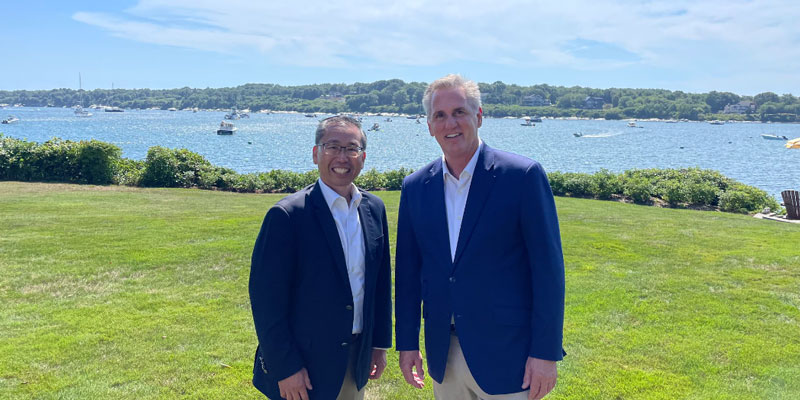As long as I’ve been paying attention to politics in Rhode Island, mainstream Republicans have given the impression that they are ashamed of their affiliation — that they just found the ruling Democrats to be so off-base and corrupt that they needed a different option, and the GOP was the only viable one. This isn’t a winning attitude, and it’s only been amplified as its losing streak has compounded.
If your brand is “somewhere else that you can go,” your constituency will be limited to people who are so fed up with their first choice that they can’t take it anymore. For people who grew up indoctrinated to believe that the Democrat Party is for “the little guy” and must be supported as a matter of good will and tradition, “can’t take it anymore” is an extremely high threshold. Sure, “the good guys” may have their problems, but they’re trying, and their hearts are in the right place.
Naturally, the Democrats, including their mainstream-media wing, have reinforced their defenses by painting their opposition as unacceptable, as evidenced by the fact that even its supporters have to hide their affiliation. In the past week, we’ve had an excellent example of this strategy in action.
The single best case for Allan Fung’s Republican campaign to represent Rhode Island in Congress is that the GOP is almost certain to reclaim control of the House in November. Having Democrat-only representation in the House and Senate does not serve Rhode Island well when control is apt to change hands as regularly as it has been.
So, when Speaker-of-the-House-in-Waiting Kevin McCarthy arrives in Rhode Island to tout Fung’s campaign, that reinforces Fung’s best case. Yet, mainstream Democrat-journalists like Edward Fitzpatrick of the Boston Globe presented the visit as a liability, giving over around three-quarters of their coverage to Democrats to spin about how much of a risk the visit is to Fung.
Worse, the Fung campaign facilitated this treatment by being conspicuously silent, as represented to perfection with the Globe’s updated headline, now that Fung has offered a statement: “Fung breaks his silence about Kevin McCarthy’s visit to R.I.” Politicians don’t “break their silence” when they’re proud or enthusiastic about something.
The hook for the media was McCarthy tweeting a picture of his visit, as shown in the featured image of this post. McCarthy has been touting Fung nationally because his viability as a candidate shows how far into blue territory the red wave may go, this autumn. That excitement should be fostered in Rhode Island, too.
Rhode Island Republicans should harness that excitement to inspire their voters to go out and, while going about their lives, make the case for their beliefs and normalize their party.
[Open full post]On WNRI 1380 AM/95.1 FM, John DePetro and Justin Katz discuss:
- The Fung camp lets the media and Democrats turn his best argument into a liability
- Matos hides from debate
- McKee hides from access to public records requests
- The mysteries of the CD1 Democrat primary
- Nellie targets the right audience with the wrong style
- The General Treasurer candidates fight for approval from RI’s aristocracy (government unions)
Featured image by Lena DeFanti on Unsplash.
[Open full post]An underappreciated risk laps at the legs of our advanced knowledge. When people didn’t know why things were happening in the world around them or how to predict change, they just dealt with them. They invested some energy in a relationship with gods in the hope of exerting some control on their environments, but mostly, they adapted. The gods would not respond predictably, forcing people to plan for their rituals’ unlikelihood of success. So, they moved around; they changed their habits.
When people think they know why things are happening and how to predict change, they fall into the delusion that they can take action that will be more effective than those old rituals. Surely, if we can predict tides to the inch one-hundred years out (which we can’t, but put that aside), we can do something to affect outcomes we don’t like. This combination of having something (and, often, someone) to blame for undesirable outcomes and feeling that there may be something concrete and scientific reduces the sense that adaptation should be the strategy.
So, we keep getting articles like this from journalists such as the Providence Journal’s Alex Kuffner:
Last October, when seawater encroached on power lines at a substation in Warren, Rhode Island, the skies were blue.
There wasn’t a nor’easter. No hurricane sending its wrath north. It was a typical autumn day — with a king tide.
New Englanders often associate flooding with storms, and rightfully so. But imagine sunny days with impassable roads, bubbling storm drains and basements-turned-swimming pools? Those scenarios will become much more common, like during a full moon or change in prevailing winds or currents, according to a report released this week by the National Oceanic and Atmospheric Administration.
We need to learn to read with a skeptical eye. First, king tides are not climate change; we live on a giant, moving, and irregularly shaped ball covered in water, which produces irregularities. Second, the future-casting of problems requires more substantiation than, say, a graph of actual changes. Third, when a journalist breaks the fourth wall to ask the reader to “imagine” some future circumstance, the article is an exercise, not in reporting, but in advocacy.
A little skepticism would also help us address concrete, solvable problems, considering all of the relevant factors. For instance:
There [are] also high numbers of low-income people of color who live along the waterfront.
“The only grocery store in East Boston, at a really big tide, salt water will touch the back of the supermarket, putting people’s food security at risk,” Wormser said. The New England Produce Center in Chelsea, one of the largest in the world, floods during high tides and storms.
You know what else puts people’s food security at risk? Economic downturns and an inability to produce and ship food. Those human activities are representative of the ways in which we survive and adapt, and over thousands of years, they’ve proven much more reliable than efforts to stop natural change.
Featured image via Shutterstock.
[Open full post]As local media sources have started to track instances of monkeypox in our area, I’ve wondered how many Rhode Islanders know that it is mostly (although not entirely) a venereal disease spreading mostly among gay men. Except, as Rod Dreher points out, that’s not a fact to which we’re permitted to react:
Scott Gottlieb, former FDA commissioner, writes in the NYT that monkeypox is about to become another huge public health failure. His reasons for that grim conclusion are sound, but not once does he mention that the authorities could easily and effectively respond in part by shutting down gay sex clubs. Gay men cannot fail; they can only be failed by public agencies.
The contrast with our still-recent experience with COVID is striking. Dreher makes it concrete in the person of Luisiana Governor John Bel Edwards, who oversaw a tremendous shutdown of economic activity for COVID but won’t impose limits on the Southern Decadence Festival in light of monkeypox.
Of course, the two epidemics may be pointing to the same problem. A major reason the COVID response was so invasive is that we didn’t allow ourselves to distinguish between groups of people whose demographics put them in different risk categories. Either we all must suffer or no precautions may be taken.
This imperative may backfire on progressives in the long run. After all, if we’re all going to be restricted and freed without distinction, the boundary for acceptable behavior for everybody will constrict.
[Open full post]When discussing public policy, responsible politicians, journalists, and members of the public should never separate the issues of energy and the environment. They are a single, nuanced, and extremely complicated issue. Absent this imperative, Democrat Governor Dan McKee feels free to brag about his environmental policy thus …
“Over last 16 months my administration has made historic investments and progress to address climate change,” McKee said, citing a bill he signed requiring 100% renewable electricity offsets by 2033 and a procurement for 1,000 kilowatts of offshore wind power. “There hasn’t been a more aggressive governor in the history of the state of Rhode Island, in terms of actually putting forward plans and activating resources.”
… while playing the populist when it comes to energy policy thus:
McKee on Monday filed public comment with the PUC asking them to suspend the customer charge on electric bills until next summer and suggested spreading the rate hike over 12 months.
The governor also asked the commission to give out the $32.5 million in electric ratepayer bill credits that were part of the state’s settlement with Rhode Island Energy’s parent company PPL.
“An increase of this magnitude has a potentially devastating impact on residential ratepayers, particularly our most vulnerable populations, including low-income, the elderly and seriously ill individuals,” McKee said Monday.
It would be very easy, indeed, to overstate the influence of Rhode Island politicians, and this governor in particular, on energy prices, just as it is very easy, indeed, to overstate their ability to affect the environment, but the two are undeniably linked. To the extent Rhode Island policy has an effect on the environment, it also has an effect on energy prices, and the cost increases we’re facing are a direct consequence of such policies on national and international levels, which begin with environmentalist ideology.
Unfortunately, few influencers of public debate in our state want people to understand the intricacies of cause and effect in this area. The guiding strategy is to vilify energy providers so as to force society to bend to environmentalists’ ideological demands, which are born of self-interest and fear, and then to vilify energy providers again in order to demagog against the consequences of the very same demands.
Featured image by Justin Katz.
[Open full post]On WNRI 1380 AM/95.1 FM, John DePetro and Justin Katz discuss:
- The cost of a soccer stadium
- The cost of union endorsements for the governor
- The cost of a mayor’s endorsement
- The value of the GOP Speaker-to-Be’s visit
- The coin toss between McKee and the Projo
Featured image from Daniel McKee campaign ad.
[Open full post]It occurred to me — as I realized how little I’ve posted this week — that I used to be a good deal more autobiographical on this site, which makes posting easier. To offer a summary by way of remedy, I’m pursuing an advanced degree, for which (relatively speaking) I’m of an advanced age. Meanwhile, my paid work has increased beyond what I’d planned for my daily schedule. That’s a welcome development, indicating a recovery from my lost job with the Center for Freedom & Prosperity last year, but it does strain my days a bit.
For some reason I cannot articulate, a very specific scene from the 1979 movie Breaking Away came to mind this evening. The plot of the movie is less important to this post than the fact that I saw it on cable TV (remember that?) when I was a teenager. In retrospect, thirty some years later, I’m surprised how significant the scene was to the way I’ve lived my life:
The quick summary of the relevant details is this: The protagonist lives in a town that has become defined, within recent memory, by the college housed within its borders. The blue-collar folks carry the label of “the cutters,” referring to the prominence of stone cutting in local industry, specifically for the construction of the college. In the scene above, the protagonist tells his father, when asked whether he plans to go to college, that he’s “proud of being a cutter.” His father replies: “You’re not a cutter. I’m a cutter.”
Somehow, sitting around watching TV (probably) on a Sunday when (probably) George H.W. Bush was President, that line in a justifiably little-known movie from the late-70s struck me with life-defining force. The clip begins with the kid’s father talking about how much pleasure he derived from stone cutting. “I was young and slim and strong. I was damn proud of my work.” How many times I thought of those words when I worked as a carpenter! And how highly I valued the knowledge that I was a cutter — a genuine cutter, albeit of a different material.
In another scene, a young Dennis Quaid gripes about the hot-shot quarterbacks who come and go in the local college. “They’re gonna keep calling us ‘cutters.’ To them it’s just a dirty word. To me, it’s just something else I never got a chance to be.”
It’s been a long, long time since I watched this movie, and I think I only saw it the one time. I remember these scenes much better than I remember the plot, but as I recall, the protagonist wants to be a professional bicycle racer and spends a lot of time pretending to be Italian. I expect if I watched the movie again, I’d find that central pretense to be closely related to these scenes about being genuine and having the opportunity to be genuine. To Dennis Quaid’s character, who talks about how he still feels like he has to stay in shape as a former high-school football player, the collapse of the local cutting industry took away his ability to be damn proud of his work, leaving him only to be young and slim and strong. The protagonist’s father has become a used car salesman, with all the insinuations that implies, such that he is no longer even genuine, except as a husband and father.
Another detail I remember, because my friends and I engaged in the exact same working-class pastime, is that the kids in the movie swim in the bodies of water created by rain falling into the rock quarries over years. The quarry is a great gouge in nature — a lake with the lines of human activity plain to see. It is the heritage of the young cutters-in-name-only, and the privileged college kids invade even there. The protagonist’s father asks whether his son’s friends still go there; then, “So, the only thing you got to show for my twenty years of work is the holes we left behind.” What a great line!
I don’t remember whether the movie came to this conclusion, but these days I see it so clearly: The opportunity to be a cutter is always there. Cutting is doing your work and living your life well, whatever it entails. Live it such that you squeeze the meaning from it, and the next generation wishes it had the chance to do that work!
[Open full post]Something about this story feels profoundly discouraging to me:
Forty Rhode Island business owners traveled to Washington D.C. last week as part of the Goldman Sachs 10,000 Small Businesses Summit to meet with hundreds of officials to discuss how to boost access to capital, child care and government contracting.
Katie Schibler Conn, owner of KSA Marketing in Warwick, was one of those participants that made the trek to D.C. and spoke with Rhode Island’s U.S. Senator Jack Reed and U.S. Rep. David Cicilline.
“Small business owner” should connote a sense of independence — of providing for one’s self, one’s family, and one’s employees. It’s “yes, I built that!” Running to government for cash and subsidized family services is rent seeking, which is very much like working for the government.
[Open full post]Stories like this, from WPRI’s Shannon Hegy, too easily slip under the radar without anybody’s pointing out what, specifically, is happening:
[Cranston Park View Middle School] STEM Coordinator Caitlyn Blankenship tells 12 News she’s seen firsthand the evidence of key skills lost during the pandemic in middle schoolers, who are struggling to problem solve, work together and communicate.
“They lost the ability to work in teams during COVID, so they lost those skills of communicating with each other on very simple tasks,” she said.
The United Way Rhode Island’s Summer Learning Initiative is working to reverse that learning loss.
Marlene Guay, who manages the statewide initiative, said the need for it has grown exponentially.
She said 35 communities have applied to participate, but there is only enough funding for five. Cranston was one of the communities that was accepted.
Not mentioned is that the United Way is a progressive activist organization. Guay is not merely an educator; she’s a radical social justice warrior who is running for elective office with the far-left Political Co-Op, with a nod from Bernie Sanders, who emphasizes not equal treatment and opportunities for all, but making education “the learning agent to even the playing field with equity and representation.” This context becomes crucial when she emphasizes the need for “social emotional support.”
In the mouth of a standard educator, the adjectival phrase, “social emotional,” may mean the strategy of teaching children to regulate their emotions so that they can better interact with others in the social sphere. In the mouth of a radical like Guay, who emphasizes “equity” and “social justice” at every opportunity, the reference is certainly to transformative social emotional learning, which is “a specific form of SEL implementation that concentrates SEL practice on transforming inequitable settings and systems, and promoting justice-oriented civic engagement.”
Promoting this program in 2021, United Way listed the three goals for students of the program: “sharpening their social-emotional skills, tackling service projects to address community needs, and preparing their minds for a return to the classroom.” Notice that the educational is last of the three.
In the context of addressing children and families harmed by our society’s response to the pandemic, progressives’ primary goal is not helping them to regain the skills to interact in our society as it exists. Instead, their primary goal is to ensure that children recover from pandemic harms by becoming progressives. It’s an ideological power grab.
This may all be well and good. After all, until Guay and her comrades have their way, the United States will remain a free country, and communities and parents should be free to center their beliefs. Still, the question (cliché though it may be) answers itself: Is this how school districts and the news media would treat a program sponsored by, say, the Catholic Church and run by a Republican running for General Assembly on an explicitly conservative ticket who uses codewords indicating Christian evangelism when describing his program?
No way. And we should stop this progressive privilege whereby our institutions treat members of the leftist cult as if they’re just ordinary citizens doing objective good work with no ulterior motives.
Featured image by Alex Iby on Unsplash.
[Open full post]Rhode Island provides an excellent case study in how corruption works. Elections aren’t stolen at the ballot box (except as a last resort). Rather, corruption rigs the game at every opportunity — buying and coercing votes so that they don’t have to be stolen or manufactured. The only way to stop this is to get the money out of politics, and the only way to do that is to get as much power out of politics as feasible.
The reminder for these thoughts was the Providence Journal’s searchable tool for legislative grants, which House and Senate leaders hand out to legislators if they behave so they can buy good will (i.e., votes) in their districts. It looks like the Projo duplicated the data while setting up the tool, so check it against the House and Senate lists, but it’s instructive to look through the grants in your community.
[Open full post]







